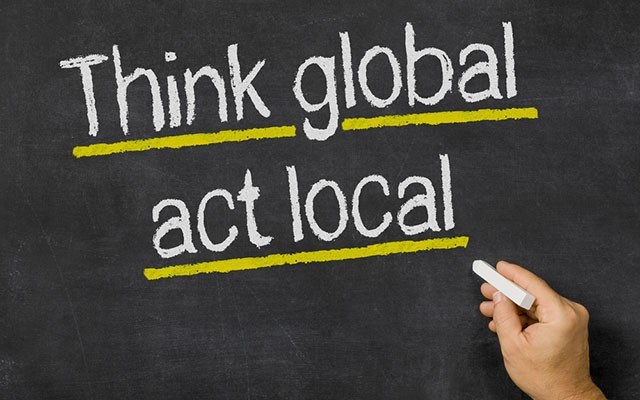One of the ironies of Canadian politics is that the highest levels of government, those with the most power, seem least interested in voters' concerns, while local governments — with the least authority — are tackling the bigger issues of the day.
The Vancouver Sun's Pete McMartin indirectly made the point in a column last week headlined: "Is climate change a civic issue? It should be."
McMartin wrote about how New York City is re-engineering its waterfront and civic infrastructure in the wake of 2012's Hurricane Sandy, and in preparation for future severe weather events expected due, at least in part, to climate change. New York is doing this now because projections are damage from the next super storm could cost even more than the $19 billion Sandy wreaked.
Across the Lower Mainland, McMartin notes, various municipalities are also taking on issues related to climate change and the environment. "Both Vancouver and Burnaby have declared their opposition to the Kinder Morgan TransMountain pipeline expansion. The City of Richmond has fought the construction of a new jet-fuel pipeline to the airport and a jet-fuel tank farm on the banks of the Fraser River. And the City of New Westminster and the City of Surrey have joined forces to fight the construction of a new coal-exporting facility. Both cities have filed for intervener status in a court case brought by environmental groups opposing the plan."
Locally, climate change and the environment were topics at last week's all-candidates meetings — hardly surprising given that the first meeting was hosted by AWARE and the Whistler Centre for Sustainability. Nevertheless, environmental matters have always been a part of Whistler politics. The difference is in 2014 we've moved past simple development vs. preservation land-use decisions.
In addition to a question on preparing Whistler for climate change, last week candidates were asked how they felt about an LNG plant in Howe Sound. And of course the current council took a stand against the proposed Northern Gateway pipeline.
Some will call this meddling — local governments wading into matters that are the jurisdiction of federal and provincial governments. But it's a reflection of voters' concerns, their access to local government officials and, to some degree, their frustration with the inaction of senior levels of government.
And climate change/the environment are not the only bigger issues where voters are looking to local candidates for answers. Affordability and relations with First Nations were common themes at last week's meetings in Whistler. Undoubtedly these are also concerns in other municipalities across B.C.
The question of affordability was brought up in a few different contexts: as it relates to daycare, to minimum wage, to a living wage and to housing. The answers illustrated the complexity of the issue, the limited abilities of the municipality to address it, and the inability of some candidates to understand it.
Mayor Nancy Wilhelm-Morden explained how the minimum wage is set by the provincial government, and that municipalities operating under the Municipal Act don't have the authority to pass such legislation.
Interestingly, one candidate for mayor of Vancouver, COPE's Meena Wong, has proposed a $15 per hour minimum wage if she is elected. Vancouver operates under its own charter, rather than the Municipal Act. Wong suggested a minimum wage could be legislated by the city after it applied to the provincial government to amend the Vancouver Charter to allow the legislation.
Meanwhile some candidates were asked for their thoughts on Whistler implementing a living wage.
On Jan. 1, 2011, New Westminster became the first city in Canada to be a "Living Wage Employer." As such, New Westminster "...requires all firms that are contracted directly or subcontracted by the City to provide services on City premises to pay their employees who perform the services a Living Wage as calculated by the Living Wage for Families Campaign." For 2014 in the Lower Mainland the living wage is $20.10 per hour, assuming no benefits are provided.
And how successful has the living wage been? No surprises here: A report by the Fraser Institute says the living wage policy is killing jobs. The Canadian Centre for Policy Alternatives says the living wage works well.
As for housing, Whistler can point with pride to the Whistler Housing Authority and all the work done locally to provide affordable housing — something that cities such as Burnaby feel is entirely a provincial responsibility.
Despite the efforts of the WHA and others, some feel more should be done. But it's a different era now. There are no Olympics on the horizon and no new development projects, hence no development cost charges to pay for additional housing.
Relations with neighbouring First Nations are probably not top-of-mind for most Whistler voters right now but at some point they will be. In the wake of this summer's Supreme Court ruling on Aboriginal title for the Tsilhqot'in First Nation they should be top-of-mind for council candidates and government officials of all levels.
The province is finally showing signs it wants to improve First Nations relations. The federal government, however, has barely acknowledged the ruling and — as with climate change — given no indication it will get involved.
And in this vacuum do local governments exist.
Bob Barnett, Pique's founding publisher and editor, is re-joining the editorial pages to cover election issues.




